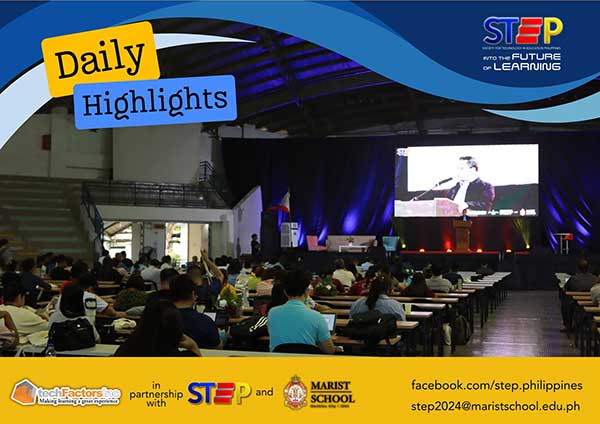
The 9th National Society for Technology in Education Philippines (STEP) Conference, a significant event in the education sector, kicked off on July 18, at Marist School, Marikina City. It brings together 1,100 educators and technology experts online and onsite from 45 schools across the nation to delve into the latest innovations and strategies in educational technology. The hybrid conference, scheduled from July 18-20, 2024, will be hosted at Marist School Marikina with three lightning talks, six keynote speeches, seven panel discussions, and 57 concurrent sessions.
Day 1 began Thursday, July 18, with a welcome message from Fr. Joaquin Jose Mari C. Sumpaico, III, SJ, EdD, President of STEP and Vice President for Basic Education at Ateneo de Manila University. Fr. Sumpaico highlighted the importance of utilizing technology to foster a culture of empowerment, support, and intentionality in education, focusing on maximizing student learning and well-being rather than the technology itself. In an interview, Fr. Mark Roberth Laurel, FMS, President of Marist School Marikina, expressed his support for the conference, emphasizing the critical role of collaboration and knowledge sharing in advancing educational practices. He stated that hosting this conference aligns with their mission to provide and inspire holistic education and to be at the forefront of integrating technology into teaching methodologies.
Ma-al Regaspi-Gorospe, STEP 2024 Conference Chairperson, shared her enthusiasm for the event, stating, “The STEP 2024 Conference is a platform for educators to learn about the latest technological advancements and share their experiences and insights. Our efforts to organize this event as we are convinced that this collaborative environment is essential for driving meaningful change in our educational practices.” Marist School Marikina is the first non-Jesuit school in nine editions to host the National STEP Conference.
The first keynote session featured Lucas Ferrarezi Grubba, a specialist in educational robotics from Marist Schools in Brazil. His talk, “Robotics, Digital Culture, and Artificial Intelligence: Journey and Challenges in Marist Brazil Schools,” highlighted the transformative potential of integrating robotics and AI in the classroom. Grubba was joined by a panel of distinguished educators, including the day’s moderator Samuel Macagba III, Assistant Principal for Formation at Xavier University, and reactors Lea Lilibeth B. Emata, Principal for Xavier University-Ateneo JHS, and Armando Codera Jr., President of TechFactors, Inc.
Throughout the morning, breakout sessions covered a diverse range of topics, which include game-based teaching for chemistry (“GamesBond”), using computer simulations (“Gizmos”), ChatGPT in math education, responsible AI integration, expanding music education with Chrome Music Lab, enhancing Filipino language skills with Animaker, gamifying assessments, improving non-music major teachers’ competencies, self-paced math learning with GeoGebra, integrating Gizmo.AI, and promoting healthy digital habits.
In the afternoon, Fr. Albert Delvo, President of the Catholic Educational Association of the Philippines, delivered an inspirational message before the second plenary session. This session, led by Janice Bello, Chief Information Officer at Ateneo de Manila University, focused on “Challenges and Best Practices in Cybersecurity for Education.” Bello emphasized the importance of a robust cybersecurity policy in educational institutions, stating, “As our schools become prime targets for cyber attacks, promoting a culture of security is paramount. Implementing practical strategies to protect sensitive information is essential.” Bello’s talk was followed by a panel discussion with educators, including Jose Allan Arellano, Executive Director of the Catholic Educational Association of the Philippines, and Excesima Pasilan, Principal at Ateneo de Davao University.
The afternoon concurrent session on Day 1 covered innovative teaching techniques (“TANDER Teaching”), data-driven decision-making, active learning in Filipino, revitalizing old computers with ChromeOS Flex, AI-personalized learning, 21st-century skills in digital assessment, evaluating eLearning practices, using digital tools for Araling Panlipunan, interactive Bible storytelling, healthy digital habits, and AI-enhanced classroom experiences.
The second day of the conference tomorrow, Friday, April 19, promises a deeper exploration into empowering educators and students with digital tools. Keynote speakers will include Hon. Marcelino R. Teodoro, Mayor of Marikina City, and Fr. Joseph Y. Haw, SJ, EdD, President of Xavier School in San Juan. The day’s morning session will cover a range of topics, from sustainable design solutions to fostering social and emotional learning through digital platforms. The concurrent morning session will include the following topics: digital tools for sustainable design, creativity in the Tinker Lab, computer game creation for school fairs, teaching statistics interactively, Filipino language teaching in the metaverse, AI for composition writing, free computer science curriculum, and practical AI strategies for educators. The afternoon concurrent sessions include a personalized research repository (“ResearchHub”), balancing tech overload with mindfulness, mobile learning for research skills, cybersecurity strategies, adapting to ICT changes, school-based maker projects, student collaboration tools like Asana, and promoting healthy digital habits.
On the final day, attendees will hear from Fidel Nemenzo, former Chancellor and Professor of Mathematics at the University of the Philippines Diliman, and Dina Joana Ocampo, former DepEd Undersecretary and Professor of Education at the University of the Philippines Diliman. Their discussions will focus on the 4th Industrial Revolution and the future of education, respectively. The day will also feature lightning talks and panel discussions on emerging trends and best practices in educational technology, with contributions from various industry experts and educators.
Day 3 concurrent session includes topics covering skill stability in the workforce, balancing video games and education, SEL songs for children, using memes in teaching, cybersecurity awareness, evaluating information with CCOW, virtual learning communication, digital catechetical programs (“Woof’s World”), fostering social skills, assessing science learning, and unplugged coding for early education.
Society for Technology in Education Philippines (STEP) is a community of educational technology advocates at the heart of transformative education in the Philippines, drawing inspiration from leading international standards to empower culturally responsive learners. It hopes to empower educators by providing professional development, fostering collaboration, and advocating technology in education. It is committed to driving meaningful change by elevating education standards; thus, it organizes STEP conferences. (Herman Lagon)